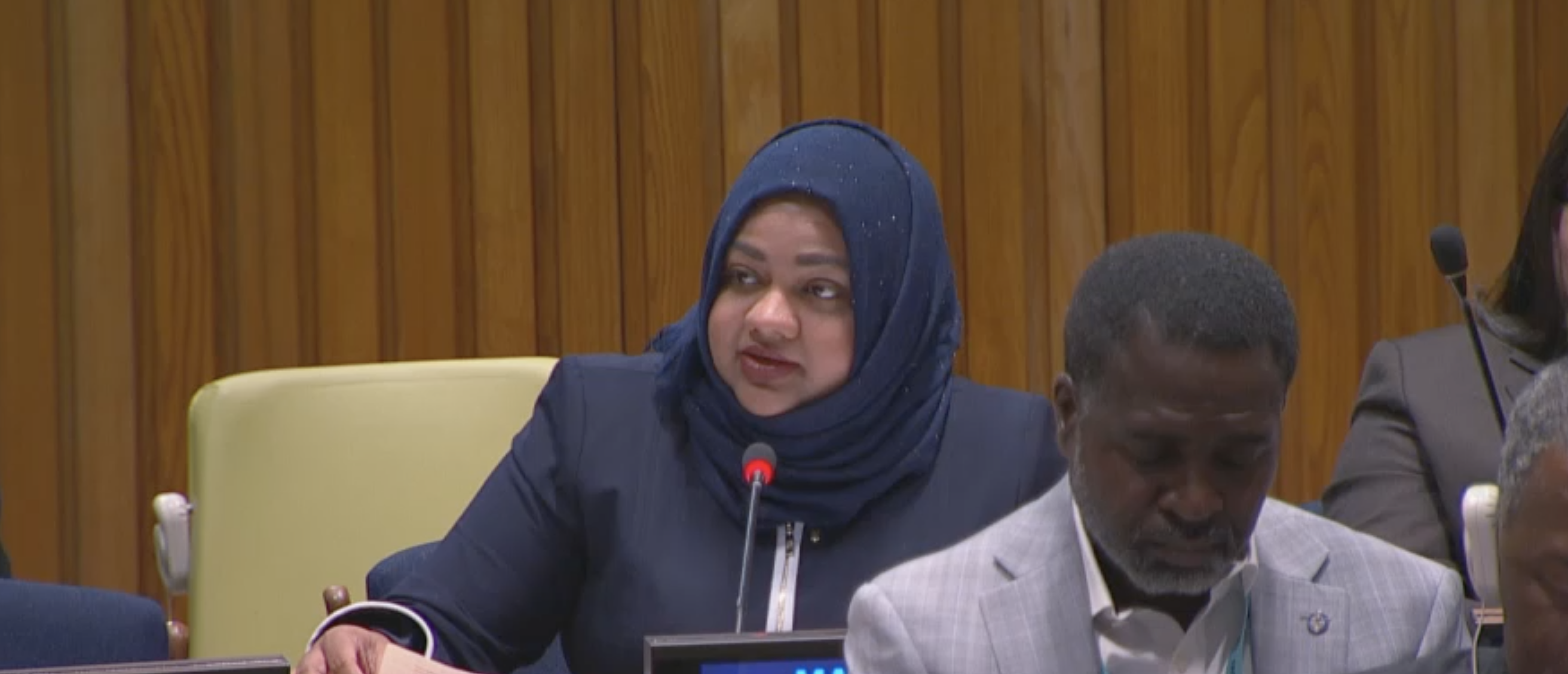At the 2023 Financing for Development Forum on 20 April, H.E. Ms. Mariyam Manarath Muneer of Maldives delivered a speech during the Roundtable: Integrated National Financing Frameworks – national actions to raise financing for the SDGs.
The Maldives have recently launched an INFF a gender-responsive financing strategy focused on climate action at its core. In her speech, H.E. Ms. Muneer shares the key elements of the country’s financing strategy and the lessons learned in the process of putting the strategy together.
She highlights that the Maldives aimed at addressing climate change challenges and meeting its net-zero target by 2030 with its INFF. Recognizing the fragmented approach to climate financing, the Maldives' INFF seeks to integrate, leverage, and close gaps.
The strategy identifies three major challenges: fossil fuel dependency, external shock resilience, and investment in sustainable and inclusive growth. With 16 financing objectives and over 100 action points, the strategy aims to unlock domestic and international financing aligned with national policies and development goals. Examples include developing an inclusive insurance market focused on risk finance products for climate hazards.
The speech also underlines three lessons learning during Maldives’ INFF process: integrating gender into all objectives, employing a consultative multi-stakeholder approach, and aligning actions with national priorities. These reflections provide a foundation for creating comprehensive, inclusive financing strategies for other nations.
The full transcript of the speech is attached below.
Thank you very much. I am very pleased to be able to share the experience of developing an integrated national financing framework in the Maldives.
We formally endorsed and published our gender-responsive integrated national financing strategy in March this year, becoming the first SIDS country in the world to launch an INFF financing strategy.
Even before the INFF, Maldives has been a highly vulnerable nation to the effects of climate change. We were very active in leading in the climate agenda on a global level, including considerable efforts to raise various forms of climate financing.
However, it was a fragmented approach, and with the INFF, we have identified ways to integrate, leverage, and also close the gaps. For this, I would like to start by thanking all the stakeholders who work closely together with the government for two years, UN agencies, and particularly our key partner in this work, the UNDP. The country team has held a very strong partnership with the Government of the Maldives for the last two years to undertake this work.
In developing the Maldives INFF, we first undertook a development financing assessment that identified the challenges in achieving our national strategic objectives and our international commitments towards climate change, including our net zero target by 2030.
To achieve our net zero targets, climate action has always remained as our government's funding priority. We spent $96 million directly from our budget alone for climate change mitigation and adaptation activities last year. However, the latest estimates place our climate financing needs between $800 million to $1.5 billion, which is far beyond what current public financing sources can offer.
Building on the findings of the comprehensive analysis which we have taken, we took the approach for financing strategy that all finance should be treated as climate finance in the Moldavian context and to integrate climate change as a cross-cutting issue in a multi-stakeholder approach.
We identified three major challenges and we seek to transform these challenges into opportunities to reorient the economy away from fossil fuel dependency, strengthen our resilience to external shocks and drive investments toward sustainable and inclusive growth.
The financing strategy has 16 comprehensive financing objectives and more than 100 different action points covering transformative and system level changes to unlock financing, both domestically and internationally, while being aligned with our existing national policies and developmental goals.
As an example, one of the financing objectives is the development of an inclusive insurance market with a focus on risk finance products in response to increase climate hazard events.
We had identified that there are currently very limited nature-based insurance solutions offered in the Maldives, and this poses a major risk to a country heavily dependent on our natural assets for tourism.
As such, we will provide support to the domestic insurance industry in developing targeted climate insurance products, assess and revise existing legislation and policies to create a more conducive environment for such products, and connect with global partners to develop capacity of the insurance and regulatory sector.
From the INFF financing strategy development process, I would like to quickly highlight three reflections in particular.
Number one, gender is a key component of this finance strategy and integrated into all 16 financing objectives.
Number two, I would like to highlight the importance of a consultative approach and multi-stakeholder engagement in developing the financing strategy. There have been extensive rounds of consultations under the stewardship of the INFF Oversight Committee, consisting of 13 government agencies bringing together different stakeholders, including the private sector, civil society, and our development partners.
Number three, the financing objectives and specific actions are in full alignment with our national priorities and build on ongoing and planned works within the Government of the Maldives.
The INFF approach has helped to develop a complete picture of the climate financing landscape in the Maldives and identify gaps that need to be filled in order to finalise the certain climate financing avenues.
There's still a significant amount of work required for Maldives for the successful implementation of the INFF. There's a lot to learn from the global best practices in setting up sustainable financing system and the country's individual experiences.
The depth and the breadth of the policies and reforms included in the strategy require contributions of multiple stakeholders. Therefore, we continue to count on our international and local partners' collaboration and support in implementing this financing strategy.
To build on the momentum from publishing the climate financing strategy and strengthen the coordination of climate finance in the Maldives, The Ministry of Finance is establishing the Maldives' Climate Finance Hub as a technical assistance and knowledge hub to support the implementation of the climate-focused financing strategy and provide technical expertise on climate financing throughout the country.
Lastly, I would like to acknowledge again the work that has been done with our partners for the historic loans of the Maldives' INFF.
Thank you.












.png)


